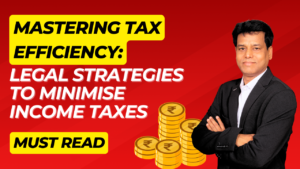Discover commonsense and legitimate techniques to limit your personal taxation rate. Investigate powerful duty arranging strategies, allowances, and credits to advance your expense reserve funds while remaining agreeable with the law.
Personal duties can be a huge monetary weight, however with the right information and methodologies, you can limit your duty commitments while complying to lawful rules. This extensive aid will disclose a scope of useful and legitimate ways to deal with improved charge effectiveness, permitting you to hold a greater amount of your well deserved pay.
Segment 1: Income Tax Planning for Incomes Under $100,000
Upgrading charge productivity is fundamental, no matter what your pay level is. This segment investigates explicit systems customised for people procuring under $100,000 every year.
1.1 Capitalising on Deductions:
Find less popular tax breaks that can considerably diminish your assessment responsibility. Figure out how to use credits like the Procured Pay Credit, Saver’s Credit, Instruction Credits, and Youngster and Ward Care Credit for your potential benefit.
1.2 Easy Income Tax Deductions Made Simple
Investigate the effect of the Tax reductions and Occupations Act (TCJA) on allowances. Augment your expense reserve funds by using the expanded standard derivation, understanding Government managed retirement benefit tax assessment, and exploiting long haul capital additions with the 0% duty section.
Segment 2: Unveiling Tax-Free Income Sources:
This segment centres around promptly accessible allowances that can assist with limiting your personal charges. Find different wellsprings of tax-exempt pay and derivations that can essentially lessen your general taxation rate.
2.1 Unveiling Tax-Free Income Sources:
Figure out how provision, youngster support, instalments, legacies, and money discounts can turn out tax-exempt revenue. Moreover, investigating the duty benefits of managers gave medical services benefits, child care allowances, labourer’s pay advantages, and incapacity benefits.
2.2 Maximising Deductions:
Comprehend the tax breaks of the §121 prohibition for gains from selling your main living place. Investigate the Unfamiliar Pay Prohibition and find how extra security strategy passing advantages can be tax-exempt. Exploit these allowances to successfully decrease your duty responsibility.
Area 3: Leveraging Powerful Tools for Tax-Free Income
This segment dives into two integral assets that can create significant tax-exempt pay: cash-back remunerations and Roth IRAs. Find how to use these assets for ideal assessment proficiency.
3.1 Optimising Cash-Back Rewards:
Reveal the capability of money back remunerations presented by Mastercards. Learn compelling procedures for augmenting cash-back remunerations while remaining inside legitimate limits, guaranteeing tax-exempt pay.
3.2 Unveiling the Roth IRA Advantage:
Investigate the duty benefits of Roth IRAs, including tax-exempt development and dissemination. Acquire experiences into examples of overcoming adversity like Peter Thiel’s striking accomplishment and figure out how to use a Roth IRA to gather tax-exempt riches. Find speculation open doors inside Roth IRAs, for example, market protections, list assets, and undertakings.
Addressing Common Concerns: FAQs
Q: Is insurance necessary if I already have an emergency fund?
A: While an emergency fund is crucial, insurance provides a broader safety net for unexpected events, ensuring your financial stability isn’t compromised.
Q: Can insurance help with estate planning?
A: Absolutely. Life insurance can play a pivotal role in estate planning, facilitating the seamless transfer of assets to beneficiaries.
Q: Are there instances where insurance may not be necessary?
A: Dr. Samaddar suggests that insurance should align with individual circumstances. For instance, if you have ample savings to cover unforeseen expenses, insurance might play a lesser role.
Q: How can I determine the right insurance coverage?
A: Dr. Samaddar advises a comprehensive evaluation of your financial goals, responsibilities, and risk tolerance. Seeking professional guidance can help tailor coverage to your needs.
Q: Can insurance aid in tax planning?
A: Yes, certain insurance products offer tax advantages. For instance, contributions to retirement insurance plans can result in tax benefits.
Q: How does insurance contribute to a holistic financial plan?
A: Insurance complements a holistic financial strategy by providing protection against risks that can disrupt your financial goals. It ensures that unforeseen events don’t impede your progress.
Conclusion:
Accomplishing charge proficiency is an essential part of dealing with your funds shrewdly. By executing legitimate methodologies illustrated in this aide, you can limit your annual expense commitments while agreeing with the law. Assume command over your expense arranging today and secure a more brilliant monetary future with expanded reserve funds and diminished taxation rates.


